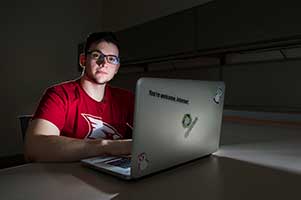May 5, 2016
Dustyn Tubbs: Portrait of a 2016 SVSU graduate
From: Midland
High school: Bullock Creek
Major: computer science
Future: graduate student, University of Illinois at Urbana-Champaign Master of Computer Science program
 Dustyn Tubbs is ready for the next upgrade.
Dustyn Tubbs is ready for the next upgrade.
The Midland native has spent much of his time at Saginaw Valley State University equipping himself with a level of knowledge and a breadth of research experience that undergraduate students eyeing a career in computer technology typically do not possess. Now Tubbs does, and his work has earned him entry into one of the nation’s top graduate schools for computer science.
“I’m very fortunate,” said Tubbs, set to begin in August 2016 at the University of Illinois at Urbana-Champaign, recently ranked by U.S. News as one of the five best schools in the nation for graduate-level computer science programs.
“It’s a great opportunity.”
Not only is Tubbs enrolled. His résumé was so impressive that he earned a teaching assistantship that will pay his entire tuition at the institution, located between Chicago and St. Louis.
Tubbs said he might have missed the opportunity if he hadn’t attended SVSU, where he will receive his bachelor’s degree in computer science in May 2016.
“A lot of the successes had to do with having very good relationships with faculty members, who are there for you, for professional issues and personal issues,” he said.
“At SVSU, you are afforded opportunities to perform professional research, and that helped me a lot. To be able to say I had research experience as an undergraduate student makes me a unique applicant to a lot of institutions with graduate programs.”
One of those opportunities teamed him with Khandaker Rahman, SVSU assistant professor of computer science & information systems. Through a grant with the Michigan Space Grant Consortium, the pair researched facial recognition technology in smartphones.
“What really impressed me about Dustyn — and was a deciding factor in offering him the chance at research with me — was not how he was right, but how willing he was to be wrong,” Rahman said. “However rare that was for him, he always saw it as a chance to learn. I believe it was both his capacity as a student and as a curious budding scholar of computer science that helped him achieve unimaginable successes.”
The two also collaborated on research exploring movement-based authentication for smartphones. In other words, the work examined how smartphone users could unlock the device by waving it around in a certain pattern.
The work led Tubbs to present the research in August 2014 at the USENIX Security Symposium in San Diego, where international researchers, practitioners and professionals gather to discuss the latest advances in computer system security.
Tubbs also presented his studies on smartphone facial recognition technology in November 2015 at the International Conference on Multimedia Communications Services and Security. The destination that time: Kraków, Poland.
“I was one of two undergraduates at that conference, and I was able to give a presentation,” he said. “That’s not something a lot of undergrads get to do. So that was pretty swell.”
Opportunities such as these helped Tubbs secure a National Science Foundation Research Experience for Undergraduates grant in summer 2015 to study computer science — specifically, artificial neural networks — at the University of Illinois at Urbana-Champaign.
“It was mind-blowing,” he said of the experience. “I consider it a defining moment in terms of how I want to move forward. It was very motivating.”
The motivation, of course, led him to apply at the University of Illinois at Urbana-Champaign to continue his studies. He hopes to study the sort of machine learning and data science that is humanizing the world’s computer networks and upgrading the human experience.
“I don’t think our time should be spent doing very basic things when computers are able to do them for us,” Tubbs said.
“How many farmers have an oxen that plows fields today? They all have tractors now. Artificial intelligence is one of those tools that can help us make better use of our time. I would be happy to write a program that would allow an artist or a scholar to follow their dreams.”
In the meantime, Tubbs is grateful SVSU helped him follow his dreams.
